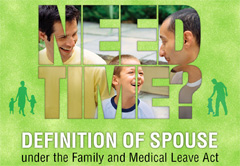 Effective March 27, 2015, a final rule from the U.S. Department of Labor (DOL) will extend the protections of the federal Family and Medical Leave Act (FMLA) to all eligible employees in legal same-sex marriages, regardless of where they live.
Effective March 27, 2015, a final rule from the U.S. Department of Labor (DOL) will extend the protections of the federal Family and Medical Leave Act (FMLA) to all eligible employees in legal same-sex marriages, regardless of where they live.
Under the FMLA, an eligible employee of a covered employer (50 or more employees in at least 20 workweeks in the current or preceding calendar year) is entitled to take unpaid, job-protected leave for specified family and medical reasons. Consistent with previously issued proposed rules and agency guidance, the final rule makes the following major changes:
- The FMLA regulatory definition of “spouse” is based on the law of the place where the marriage was entered into (previously, the definition of “spouse” only applied to same-sex spouses residing in a state that recognizes same-sex marriage).
- The final rule’s definition of “spouse” expressly includes individuals in lawfully recognized same-sex and common law marriages, as well as same-sex marriages entered into abroad that could have been entered into in at least one state.
This definitional change means that eligible employees, regardless of where they live, are entitled to:
- Take FMLA leave to care for their lawfully married same-sex spouse with a serious health condition;
- Take qualifying exigency leave due to their lawfully married same-sex spouse’s covered military service;
- Take military caregiver leave for their lawfully married same-sex spouse; and
- Take FMLA leave to care for their stepchild (child of the employee’s same-sex spouse) or stepparent who is a same-sex spouse of the employee’s parent, even if certain in loco parentis requirements are not met.
More information is available on the DOL’s FMLA Final Rule Website, which includes links to the DOL’s fact sheet and frequently asked questions.
